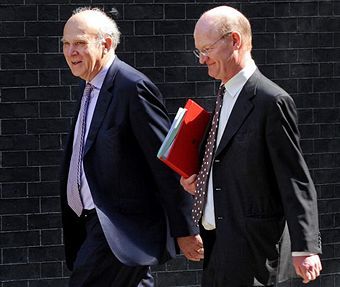 Ever the opportunist, Ed Miliband recognised that university funding could be the
coalition’s first test of resolve. Opposing a tuition fee hike has given him
the chance to serenade disgruntled Liberal Democrats and to discard New Labour’s sheen (which so incensed Alan Johnson, the minister who introduced the fee in such difficult
circumstances). Miliband is determined to mould the Labour party in his image. Speaking on the Politics Show yesterday (16:20 in), he said
that the party, Johnson included, will strive to deliver a graduate tax.
Ever the opportunist, Ed Miliband recognised that university funding could be the
coalition’s first test of resolve. Opposing a tuition fee hike has given him
the chance to serenade disgruntled Liberal Democrats and to discard New Labour’s sheen (which so incensed Alan Johnson, the minister who introduced the fee in such difficult
circumstances). Miliband is determined to mould the Labour party in his image. Speaking on the Politics Show yesterday (16:20 in), he said
that the party, Johnson included, will strive to deliver a graduate tax.
After a summer’s procrastination, the government has run out of time. The substance of Lord Browne’s recommendations is in the public domain and it has caused disquiet on government benches. The numbers are bald: the government will lose the vote if enough Lib Dem MPs revolt, an event that would prejudice the coalition’s long-term stability.
But none of that should come to pass if the government presents a careful case and does not allow Milband to dictate or define terms. It must state, as Professor Michael Arthur did on Today, that tuition fees are not an upfront charge, as in the American system. Rather the government pays the upfront cost, while the student repays the loan over 25 years and according to their ability to pay. There will be at least two rates of interest – one at close to 0 percent for those of modest means and a slightly higher rate for everyone else. (Paul Goodman notes that this could double as a graduate tax – a concession to the Lib Dems.) Repayments will be suspended in the event of redundency or a career break. Also, as I understand it, any outstanding tuition fee debt that cannot be paid will be written-off after 25 years. Put simply, a hike in tuition fees will disadvantage the affluent because only they will pay it – one might almost say that it is a fair outcome in the quest to equalise educational opportunity.
The government has other impediments to overcome. There are concerns that some courses and institutions will charge more than others, supposedly privileging those who attend them. I hope that objection is dispatched with the simple observation that those students are more likely to contribute more in repaying the cost of their education. There are also reservations that living costs, coupled to increased tuition fees, might discourage the disadvantaged from applying where they ought, especially if fees are not uniform. Bursaries are the answer. Consultants on Higher Education complain that universities do not advertise bursaries as effectively as they might – Lord Browne will recommend that the private sector assist universities in marketing bursaries and extending alumni endowment schemes. I suspect the bill will stand or fall on this latter point.






Comments